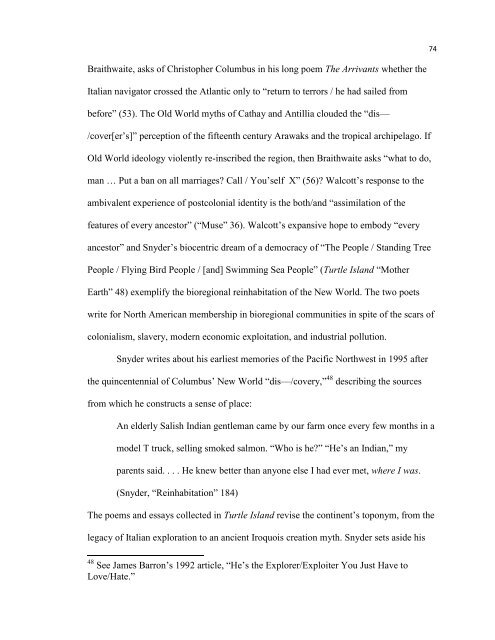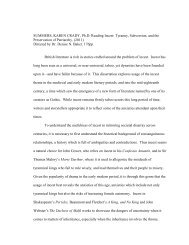RE-INHABITING THE ISLANDS - The University of North Carolina at ...
RE-INHABITING THE ISLANDS - The University of North Carolina at ...
RE-INHABITING THE ISLANDS - The University of North Carolina at ...
Create successful ePaper yourself
Turn your PDF publications into a flip-book with our unique Google optimized e-Paper software.
74<br />
Braithwaite, asks <strong>of</strong> Christopher Columbus in his long poem <strong>The</strong> Arrivants whether the<br />
Italian navig<strong>at</strong>or crossed the Atlantic only to ―return to terrors / he had sailed from<br />
before‖ (53). <strong>The</strong> Old World myths <strong>of</strong> C<strong>at</strong>hay and Antillia clouded the ―dis—<br />
/cover[er‘s]‖ perception <strong>of</strong> the fifteenth century Arawaks and the tropical archipelago. If<br />
Old World ideology violently re-inscribed the region, then Braithwaite asks ―wh<strong>at</strong> to do,<br />
man … Put a ban on all marriages? Call / You‘self X‖ (56)? Walcott‘s response to the<br />
ambivalent experience <strong>of</strong> postcolonial identity is the both/and ―assimil<strong>at</strong>ion <strong>of</strong> the<br />
fe<strong>at</strong>ures <strong>of</strong> every ancestor‖ (―Muse‖ 36). Walcott‘s expansive hope to embody ―every<br />
ancestor‖ and Snyder‘s biocentric dream <strong>of</strong> a democracy <strong>of</strong> ―<strong>The</strong> People / Standing Tree<br />
People / Flying Bird People / [and] Swimming Sea People‖ (Turtle Island ―Mother<br />
Earth‖ 48) exemplify the bioregional reinhabit<strong>at</strong>ion <strong>of</strong> the New World. <strong>The</strong> two poets<br />
write for <strong>North</strong> American membership in bioregional communities in spite <strong>of</strong> the scars <strong>of</strong><br />
colonialism, slavery, modern economic exploit<strong>at</strong>ion, and industrial pollution.<br />
Snyder writes about his earliest memories <strong>of</strong> the Pacific <strong>North</strong>west in 1995 after<br />
the quincentennial <strong>of</strong> Columbus‘ New World ―dis—/covery,‖ 48 describing the sources<br />
from which he constructs a sense <strong>of</strong> place:<br />
An elderly Salish Indian gentleman came by our farm once every few months in a<br />
model T truck, selling smoked salmon. ―Who is he?‖ ―He‘s an Indian,‖ my<br />
parents said. . . . He knew better than anyone else I had ever met, where I was.<br />
(Snyder, ―Reinhabit<strong>at</strong>ion‖ 184)<br />
<strong>The</strong> poems and essays collected in Turtle Island revise the continent‘s toponym, from the<br />
legacy <strong>of</strong> Italian explor<strong>at</strong>ion to an ancient Iroquois cre<strong>at</strong>ion myth. Snyder sets aside his<br />
48 See James Barron‘s 1992 article, ―He‘s the Explorer/Exploiter You Just Have to<br />
Love/H<strong>at</strong>e.‖
















